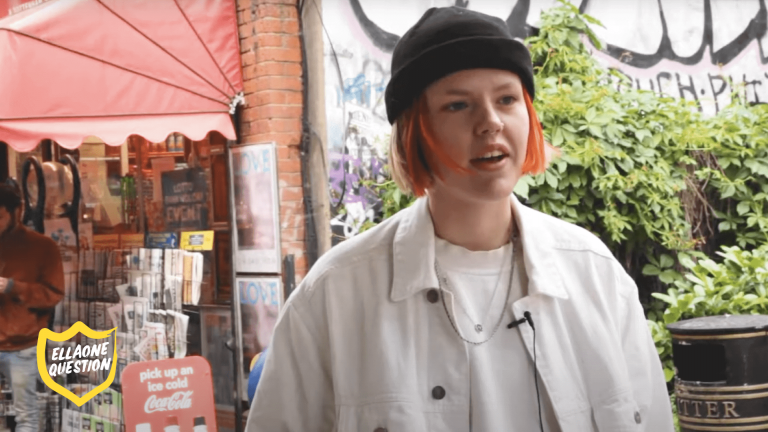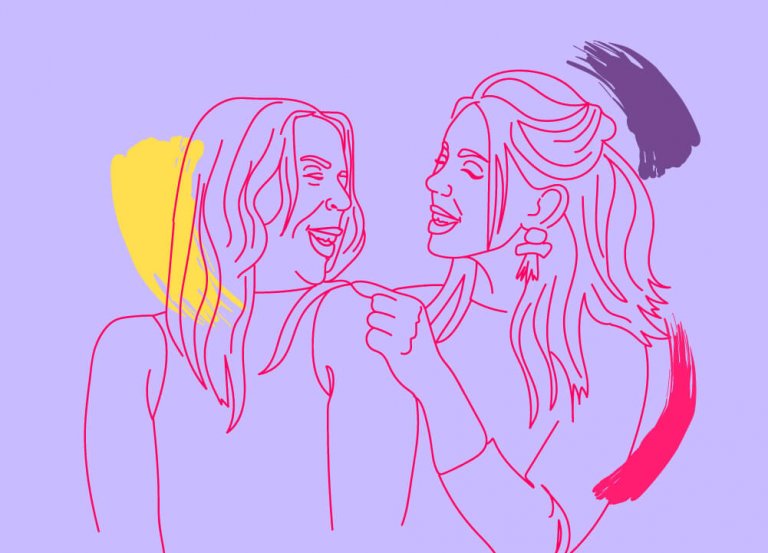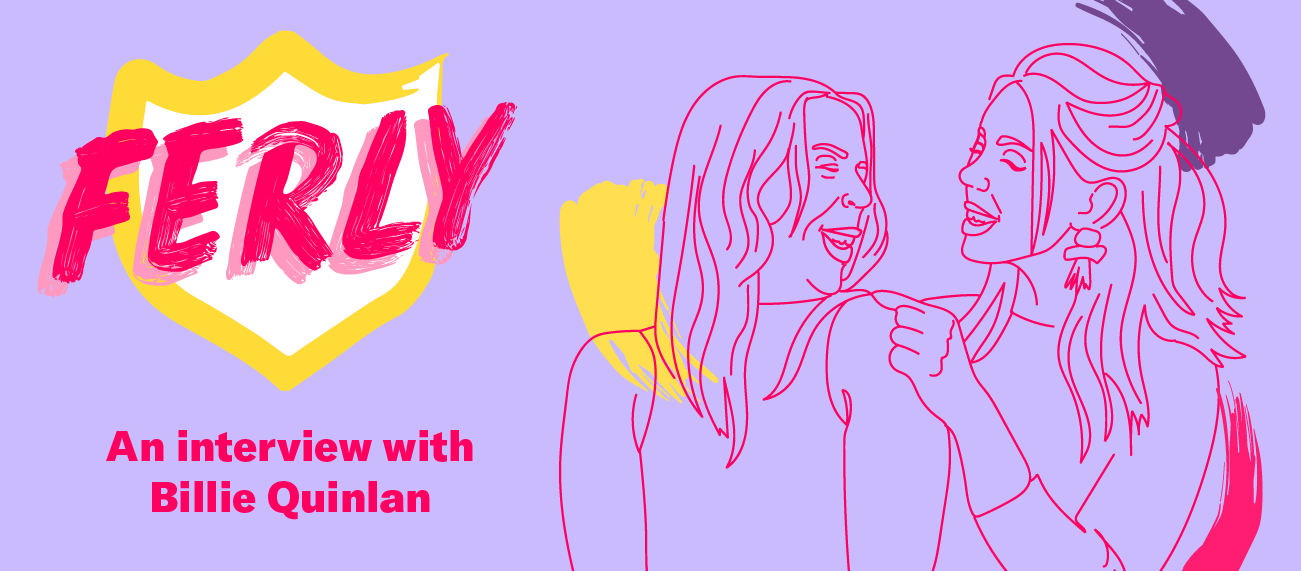Are you living your best sex life? Unlike what the media shows us, good sex isn’t a guarantee. It requires communication, mutual respect and an understanding of what you enjoy.
In 2018, co-founders Billie Quinlan and Anna Hushlak founded Ferly, an audio-based app that focuses on helping women and non-binary people feel empowered to explore their sexuality.
Through guided practices, sensual stories and fun facts, the app is designed to help people become more mindful about sex and give them the tools to seek the experiences they desire.
ellaOne spoke to co-founder Billie Quinlan to learn more about the origins of Ferly, why masturbation is crucial for a happy sex life and how the pleasure gap is standing in the way of equality.
Tell us about how Ferly started?
Ferly came out of a six-month programme which brought 50 people together to try and solve some of the worlds biggest issues.
The programme that myself and my co-founder were on was about transforming the mental and emotional health of women and girls in the developed world.
My co-founder Anna and I met on the program in October 2017 and we had an amazing time being educated by experts and entrepreneurs.
Anna and I were really disappointed by the fact that we were talking about female mental and emotional wellbeing, but sex and pleasure were completely left out of the conversation.
As far as we understand it, there are three types of wellbeing: Physical, mental and sexual, so you can’t leave a huge piece like that out of the conversation.
The taboo and stigma around female sexuality creates this fear of exploring it, understanding it and being able to look after it. Ferly was born out of that in June 2018.
What do you want Ferly to achieve?
Our big goal is to close the pleasure gap. We talk a lot about the orgasm gap between the genders, but if you look at that more holistically we have a pleasure gap.
The orgasm is a nice cherry on top, but if we’re not having a pleasurable experience with our sexuality then it doesn’t really matter if we’re having an orgasm or not.
More broadly, we see closing that pleasure gap as a necessary route to gender equality. It’s a sort of unsaid final frontier that we need to tackle if we want to see genuine equality.
Why do the audio stories in Ferly focus on the build up?
Ferly is not a porn site. We are not redesigning porn for women and we aren’t targeting women who want to use it in that way.
There’s great stuff out there if that’s what you want, but for us, it’s about giving you a taster to start your journey, build it into the discovery process and then empower you to use your imagination to go a bit further once you finish a story.
Porn is so individual. What we get stimulated by is so unique to us and if you try to cater for everyone’s experience, you’ll end up potentially creating more narratives about what’s normal.
I also think it’s quite a conscious decision around our brand and how we want to be perceived. Right now, we’re for adult women who are 18+, but eventually, we’d love to be used by younger women who are in the 16+ age range.
We would love to be an accessible place for all women to learn. I think being more of a discovery space rather than porn space allows us to go deeper into those different age groups.
How can people achieve more pleasurable, healthier sexual awareness?
There are three main areas to explore when we think about our sexuality. It’s known in the literature as bio-psycho-social modules, so: biology, psychology and sociology.
What that basically translates down to is your body, your mind and your world.
There’s a really lovely educator called Emily Nagoski who wrote a brilliant book called Come As You Are and she talks about how our sexuality is like a garden.
When we’re young, other people plant flowers or weeds in our garden. Those can be anything from your gender norms to the do’s and don’ts around sexuality depending on how you’ve been educated.
There comes a point in your life where you’re mature enough to understand what your garden looks like and see whether you want to keep it that way or recreate it.
Do you like the fact that it’s got roses in it and a thorn bush, or would you rather it have daisies and a beautiful Venus flytrap? You have to cultivate and explore your own garden.
Do you think masturbation is important for a happy sex life?
Yes. Solo sex is one of the most empowering things we can do for ourselves because it gives us the ability to explore our bodies, understand our anatomy and learn how it all works and it looks.
Once you know what your anatomy looks like, smells like and feels like, then someone’s ability to shame you or confuse you is taken away.
A lot of women have lots of fear and shame around their genitals and masturbation is a really powerful way to let go of that. It’s also a really beautiful thing you can do for your sexual self care.
Do you think there is a stigma around female sexuality?
Yes, definitely. I think it’s changing. 2019 has been a really exciting year and we’re seeing more funding going to female businesses who focus on the female experience. At the same time, we’re seeing how the male experience is prioritised over the female experience.
Society justifies it because it’s essential for men to get an erection and have an orgasm for procreation.
It’s not essential for a woman to have pleasure in order to procreate, but pleasure is essential for a healthy sexual experience so these are very outdated attitudes.
How can society become more accepting of female sexuality?
I think we need to start educating about it in schools and we need to start bringing it into conversations much more. If we do that, we’ll be able to see that there’s nothing to be afraid of.
The other way is for women ourselves to start taking responsibility for exploring our own sexuality and having these conversations, prioritising our needs and bringing other genders into that conversation as well.
What we’ve learned through our work is that other genders also really want to understand the female experience and see if they’re doing a good job.

Do you think there is a stigma around emergency contraception?
Anyone who’s ever had to go grab the morning after pill can empathise with that feeling of shame you get from walking in there.
I think we need to flip the dialogue around it. If you are taking emergency contraception in an emergency situation, well done you. Well done for trying to ensure you don’t have an unplanned pregnancy.
Where do you think the stigma which surrounds the morning after pill comes from?
I think it comes from the more holistic stigma around female sexuality and the idea we shouldn’t be having sex unless you want to procreate.
That’s the problem we have with the whole conversation. We still don’t have a very helpful narrative around sex and pleasure.
Should sex education in schools talk more about female sexual pleasure?
Definitely. Pleasure isn’t just nice to have: the World Health Organisation defines it as an important part of sexual health, so we can’t just talk about sex through a negative lens which was the kind of education I grew up with.
It is changing, but very slowly and there’s still a lot of conversations around pregnancy prevention and disease prevention rather than anything to do with pleasure.
It creates really unhelpful narratives for women when they don’t prioritise their experience and instead prioritise the experience of others, leaving them to often experience pain.
We’re sending people out into the world without information on how to have healthy sexual behaviours and attitudes. We’re doing them a disservice by not including it in the conversation.
There is a fear that if you make sex sound desirable, young people will have more of.
We know, however, that the more you educate and the more info you provide, the more likely young people are to go out to have healthier, happier and more pleasurable experiences. It doesn’t mean they’re going off and having rampant sex.
Knowledge is power. The more knowledge you can give and the more you can create an understanding of what sex should be like, the more we’ll be having healthy sex.
In the UK, one in five women is a survivor of sexual violence and sexual assault. For some, it’s a violent experience and for others its a misunderstanding of consent and miscommunication of what the experience should feel like and be like. That stems from education.
What was your own sex education like?
I honestly can’t even remember my sex education. I think I put a condom on a banana. I had a form tutor and we didn’t get on and she had to then teach me my sex education. It was really awkward.
I definitely didn’t feel like I came out of that with a healthy understanding of what my role as a woman was, how to prioritise my own experience, or how to respect myself and my partner.
I’m really fortunate that I grew up in a very loving, open family so we had a lot of conversations about what mutual respect is. They had a very loving relationship so I could see what a healthy relationship was like. I definitely didn’t get that from school.
Do you feel like you learned anything in your sex education at school?
No.
Did you learn about the vulva in sex education at all?
I learned about the vulva two years ago. When we started doing Ferly I was like ‘oh my god, it’s called a vulva!’. I’m a 28-year-old woman. How have I gone through my whole life without knowing what my anatomy is called?
At ellaOne, we want to promote healthy attitudes towards sex and relationships.
From offering a platform for people to speak openly about their experiences with the morning after pill to giving the vulva the limelight it deserves, we hope to encourage more and more people to let go of the outdated shame and stigma which surrounds female sexuality and sexual health.
If you have ever taken the morning after pill and you want to share your experience, do so below and help us put taboo to bed.
By: Sophia Moss







